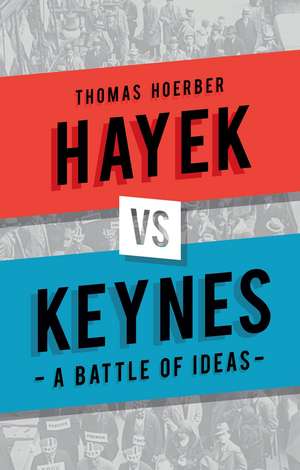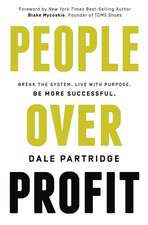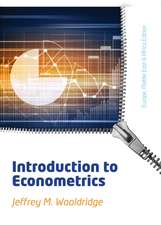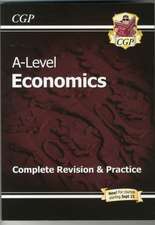Hayek vs Keynes: A Battle of Ideas
Autor Thomas Hoerberen Limba Engleză Hardback – 15 iun 2017
With a broad perspective and incisive but clear examinations of important economic theories, this book places the two great economists of the twentieth century within their historical context, illuminating how much we have learned—and can still learn—from them both.
Few thinkers better encapsulate the two polarities of economic and social thought in the twenty-first century than Friedrich Hayek and John Maynard Keynes. Wrestling with the horrors of world wars, the atrocities of fascist regimes, the hunger of the Great Depression, and the turbulence of political ideologies as they grew evermore pitted against one another, both sought a cure for modernity’s terrible problems and a safeguard against future catastrophes—a task that would leave them with completely different conclusions. In this book, Thomas Hörber offers a clear historical account of the work of these two great figures of modern economic thought.
Hoerber looks at the two central works that would alter the course of economic thought: Keynes’s The General Theory of Employment, Interest, and Money and Hayek’s The Road to Serfdom. Placing them within the context of the devastation that followed World War I, he explains how the historical conditions in which these books were written help us better understand how their lessons can illuminate the economic and political phenomena of our own era, such as the recent financial crisis, globalization, and European integration. He shows how Keynes’s emphasis on government regulation through monetary and fiscal policy and Hayek’s great cautions against the tyrannies that can so easily arise from central planning has led to competing schools of economic thought.
Making accessible classic economic theory and employing a qualitative method of economics, he offers an articulated account of how history has led to our current economic environment.
Few thinkers better encapsulate the two polarities of economic and social thought in the twenty-first century than Friedrich Hayek and John Maynard Keynes. Wrestling with the horrors of world wars, the atrocities of fascist regimes, the hunger of the Great Depression, and the turbulence of political ideologies as they grew evermore pitted against one another, both sought a cure for modernity’s terrible problems and a safeguard against future catastrophes—a task that would leave them with completely different conclusions. In this book, Thomas Hörber offers a clear historical account of the work of these two great figures of modern economic thought.
Hoerber looks at the two central works that would alter the course of economic thought: Keynes’s The General Theory of Employment, Interest, and Money and Hayek’s The Road to Serfdom. Placing them within the context of the devastation that followed World War I, he explains how the historical conditions in which these books were written help us better understand how their lessons can illuminate the economic and political phenomena of our own era, such as the recent financial crisis, globalization, and European integration. He shows how Keynes’s emphasis on government regulation through monetary and fiscal policy and Hayek’s great cautions against the tyrannies that can so easily arise from central planning has led to competing schools of economic thought.
Making accessible classic economic theory and employing a qualitative method of economics, he offers an articulated account of how history has led to our current economic environment.
| Toate formatele și edițiile | Preț | Express |
|---|---|---|
| Paperback (1) | 68.71 lei 22-36 zile | +5.81 lei 6-12 zile |
| REAKTION BOOKS – 4 apr 2025 | 68.71 lei 22-36 zile | +5.81 lei 6-12 zile |
| Hardback (1) | 153.71 lei 22-29 zile | +28.16 lei 6-12 zile |
| REAKTION BOOKS – 15 iun 2017 | 153.71 lei 22-29 zile | +28.16 lei 6-12 zile |
Preț: 153.71 lei
Preț vechi: 166.94 lei
-8% Nou
Puncte Express: 231
Preț estimativ în valută:
29.42€ • 31.97$ • 24.73£
29.42€ • 31.97$ • 24.73£
Carte disponibilă
Livrare economică 31 martie-07 aprilie
Livrare express 15-21 martie pentru 38.15 lei
Preluare comenzi: 021 569.72.76
Specificații
ISBN-13: 9781780237305
ISBN-10: 1780237308
Pagini: 192
Dimensiuni: 140 x 216 x 23 mm
Greutate: 0.34 kg
Editura: REAKTION BOOKS
Colecția Reaktion Books
ISBN-10: 1780237308
Pagini: 192
Dimensiuni: 140 x 216 x 23 mm
Greutate: 0.34 kg
Editura: REAKTION BOOKS
Colecția Reaktion Books
Notă biografică
Thomas Hoerber is professor of European studies and director of the EU-Asia Institute in the School of Management at the École Supérieure des Sciences Commerciales d’Angers, in France. He is the author of many books, including, most recently, European Space Policy and Theorizing European Space Policy.
Cuprins
Introduction
1 From the Eighteenth to the Twentieth Century: Momentous Change and Stable Elements
2 Hayek’s Road to Liberty
3 Information and Planning
4 Keynes’s General Theory
5 Man is Not the Master of His Own Fate: Misguided Socialist Idealism
6 Liberal Polemic, or, the Threat of National Socialism
7 The Necessity of Planning
8 Liberty and Totalitarianism
1 From the Eighteenth to the Twentieth Century: Momentous Change and Stable Elements
2 Hayek’s Road to Liberty
3 Information and Planning
4 Keynes’s General Theory
5 Man is Not the Master of His Own Fate: Misguided Socialist Idealism
6 Liberal Polemic, or, the Threat of National Socialism
7 The Necessity of Planning
8 Liberty and Totalitarianism
Recenzii
“Where Hoerber is correct is when he asserts that the great differences between Keynes and Hayek are relevant to today’s world.”
"The similarities Hoerber finds between Hayek and Keynes are illuminating. Hoerber emphasizes each man’s reliance on narrative to explain his ideas. The degree to which many economists equate economics with the use of mathematical formulae was deeply regretted by Hayek, and would horrify Keynes."
“The shock of the Great Depression led to intellectual tumult as economists tried to understand the causes and recommend responses. To Keynes, economic narrative offered a better approach than mathematics; to Hayek, the problem was too little abstraction. To Keynes, people could work together within the framework of the state; to Hayek, the answer was to operate within the free market. The shock of the Great Recession has not had the same impact on economics, with mathematical modeling remaining in the ascendant, and the state more often seen as the disease than the cure. Hoerber’s analysis of these two giants of the history of economics makes us reflect on the crisis of our own time as much as on the world they inhabited.”






